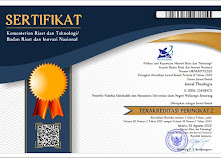REFLEKSI HISTORIS PENDIDIKAN RASULULLAH Potret Untuk Pendidikan Karakter Anak Bangsa
DOI:
https://doi.org/10.21580/teo.2012.23.1.1804Keywords:
Pendididikan Rasulullah, pendidikan karakterAbstract
Pendidikan karakter adalah kata kunci untuk membentuk dan memperkuat kepribadian anak bangsa. Kartakter yang kuat merupakan modal utama dalam mengembangkan bangsa yang berperadaban untuk memasuki percaturan dan persaingan yang semakin mengglobal. Bangsa yang berkarakter kuat sangat ditentukan oleh proses pendidikan. Proses pendidikan dan pembelajaran yang berkarakter merupakan kunci utama bagi terbentuknya kepribadian yang berkarakter, hal ini sebagaimana ditunjukkan oleh proses pendidikan dan pembelajaran yang dilalui dan dikembangkan oleh Rasulullah saw.Downloads
References
Diponegoro Z., Miranda dkk, Model Pendidikan Karakter di Universitas Indonesia, http://www.dikti.go.id. di akses tanggal 28 Juni 2011
Gülen, M. Fethullah, Prophet Muhammad Aspect of His Life, diterjemahkan oleh Tri Wibowo Budi Santoso, Versi Terdalam, Kehidupan rasul Allah Muhammad SAW. (Jakarta: RajaGrafindo Persada, 2002).
Haekal, Muhammad Husain, Hayat Muhammad. Diterjemahkan oleh, Ali Audah, Sejarah Hidup Muhammad, (Jakarta: Pustaka Litera Antarnusa, 1999).
Harefa, Andrias, Mindset Therapy, Terapi Pola Pikir, tentang Makna Learn, Unlearn, dan Relearn, (Jakarta: Gramedia Pustaka Utama, 2002).
al-Husaini, H.M.H. al-Hamid, Membangun Peradaban, sejarah Muhammad Saw, Sejak Sebelum Diutus Menjadi Nabi. (Bandung: Pustaka Hidayah, 2000), h. 210-211.
Josepshon, Michael, The Six Pillars of Character http:// charactercounts.org/sixpillars.html diakses tanggal 6 juli 2011.
Koesoema A, Doni, Pendidikan Karakter, http://www.asmakmalaikat. com/go/artikel/ pendidikan/umum1.htm, di akses tanggal 2 Juli 2011.
Lapidus, Ira M., A History of Islamic Societies. Diterjemahkan oleh, Ghufron A. Mas’adi, Sejarah Sosial Ummat Islam, (Jakarta: RajaGrafindo Persada, 2000), h. 29
Lima Tujuan Gerakan Pendidikan Karakter, http://nasional.kompas.com, di akses tanggal 2 Juli 2011.
Mubarakfury, Syaikh Shafiyyur Rahman, Sirah Nabawiyah, (Jakarta: Pustaka al-Kautsar, 2001).
Muhammad Sebagai Syariah Marketer, http://www.koperasisyariah. com., di akses tanggal, 3 Juli 2011.
Pendidikan Karakter Sebagai Pondasi Kesuksesan Peradaban Bangsa, http://www.dikti.go.id. Diakses, tanggal 2 Juli 2011
Subhani, Ja’far, The Massage, Diterjemahkan oleh, Muhammad Hasyim dan Meth Kieraha, Ar-Risalah, Sejarah Kehidupan Rasulullah saw. (Jakarta: Lentera Basritama, 2000).
Sudradjat, Akhmad, Pendidikan Karakter, http://akhmadsudrajat. wordpress.com. Diakses tanggal, 2 Juli 2011
Suyanto, Urgensi Pendidikan Karakter, http://mandikdasmen. kemdiknas.go.id. Diakses tanggal, 1 Juli 2011.
Undang-Undang Sistem Pendidikan Nasional No. 20 tahun 2003 (Jakarta: Departemen Agama RI, 2007).
Downloads
Published
Issue
Section
License
The copyright of the received article shall be assigned to the journal as the publisher. The intended copyright includes the right to publish the article in various forms (including reprints). The journal maintains the publishing rights to the published articles.
Note: Authors are allowed to use their articles for any legal purposes deemed necessary without written permission.
Licensing

This work is licensed under a Creative Commons Attribution-ShareAlike 4.0 International License.
_______
Copyright Transfer Aggreement
In order for Jurnal Theologia to publish and distribute research articles, the editors need publishing rights (transferred from author to publisher). This agreement relates to the transfer/publishing copyright license to Jurnal Theologia but the authors still have significant rights to use and share their published articles.
Jurnal Theologia supports the need for writers to share, disseminate and maximize the impact of their research and their rights on any database. As a journal article writer, you have the right to various uses of your articles, including that by the institution or company where you work. Copyright can be used without the need for special permission. Authors who publish articles in the Jurnal Theologia have broad rights to use their work for teaching and scientific purposes without requesting permission, including:
- Use by the author for lectures, presentations, or conferences, with distribution of copies to participants;
- Distribution to colleagues for research use;
- Use in compilations of the author's subsequent work;
- inclusion in a thesis or dissertation;
- Reuse of sections or excerpts from articles in other works (with full acknowledgment of the final article);
- Preparation of derivative works (other than commercial purposes) (with full acknowledgment of the final article);
- Voluntary posting on open websites operated by authors’ or writers' agencies for scientific purposes
When submitting a manuscript, authors do so on the understanding that if accepted for publication, the copyright for publishing (publishing right) of the article shall be assigned/transferred to Jurnal Theologia.
Authors whose articles are accepted for publication will receive confirmation via email and sent a Copyright Transfer Agreement.














